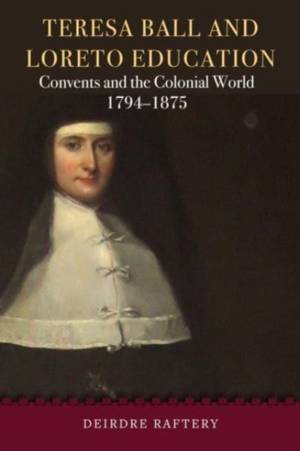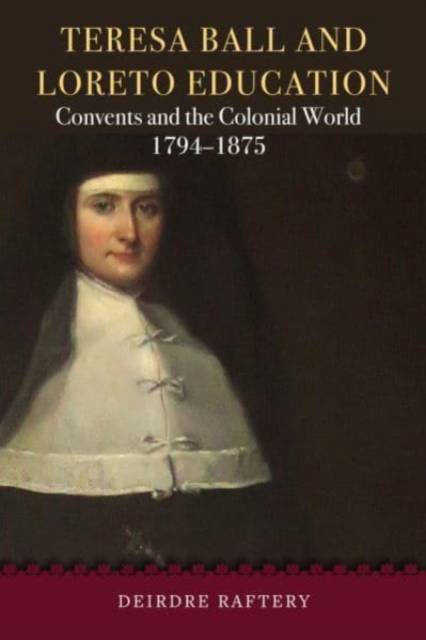
- Retrait gratuit dans votre magasin Club
- 7.000.000 titres dans notre catalogue
- Payer en toute sécurité
- Toujours un magasin près de chez vous
- Retrait gratuit dans votre magasin Club
- 7.000.0000 titres dans notre catalogue
- Payer en toute sécurité
- Toujours un magasin près de chez vous
Teresa Ball and Loreto Education
Convents and the Colonial World, 1794-1875
Deirdre Raftery
Livre relié | Anglais
47,45 €
+ 94 points
Description
Educated at the Bar Convent, York, Teresa Ball became a pioneer of girls' education when she returned to Ireland, opening Loreto Abbey convent and boarding school in 1822. The Dublin convent quickly attracted the daughters of the Irish elite, not only as pupils but also as postulants and novices. The rapid expansion of Loreto convents in Ireland helped to provide a supply of nuns who founded a network of Loreto convents in nineteenth-century India, Mauritius, Gibraltar, Canada, England, Spain, and Australia. This book commences with an original and important study of the Balls and their social world in Dublin at the start of the nineteenth century. Their network included members of the Catholic Committee, the Catholic Church hierarchy, and many benevolent public figures. The book gives new insight into how women operated in the margins of this Catholic world. The education of the Ball children, at York and Stonyhurst, positioned them for success in Catholic society, at a time when the confidence of their Church was growing in Ireland. The youngest of the Ball children was professed as a nun in 1816, in the York convent of the Institute of the Blessed Virgin Mary (IBVM), and returned to Dublin as Mother Teresa Ball, in 1821. With the encouragement of Dr. Daniel Murray, Teresa Ball established the IBVM at Loreto Abbey, Rathfarnham, in 1822. The convent educated the elite, and also attracted the daughters of the growing Catholic middle class. The book draws on extensive archival records, to reconstruct the history of the convent, showing how it became the 'motherhouse' to Loreto convents around the globe. The international network of Loreto convents expanded quickly in the nineteenth century, providing schooling for the Catholic colonial world. How did Teresa Ball prepare her nuns to negotiate this world? Where did they go, and what kind of distinctive 'Loreto education' did they bring with them? The book answers these questions, while also providing a new and important account of global Catholic schooling, and some of the Irish women behind it.
Spécifications
Parties prenantes
- Auteur(s) :
- Editeur:
Contenu
- Nombre de pages :
- 256
- Langue:
- Anglais
Caractéristiques
- EAN:
- 9781846829765
- Date de parution :
- 29-04-22
- Format:
- Livre relié
- Format numérique:
- Genaaid
- Dimensions :
- 159 mm x 235 mm
- Poids :
- 535 g

Les avis
Nous publions uniquement les avis qui respectent les conditions requises. Consultez nos conditions pour les avis.






